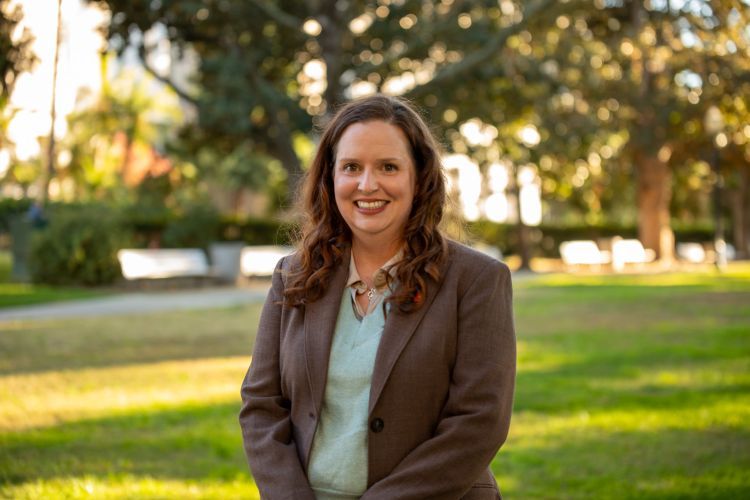Breadcrumb
McGeorge’s Immigration Law Clinic assists members of Afghan community

Third-year law student Flora Feizi assists a local Afghan resident filing a Humanitarian Parole application on behalf of a loved one. Photo by Ashley Golledge.
The Immigration Law Clinic at the University of the Pacific McGeorge School of Law is hosting weekly workshops to assist Afghan refugees file Humanitarian Parole applications. These petitions, if approved, allow those impacted by the ongoing crisis in Afghanistan to obtain permission to come to the U.S.
More than 30 McGeorge School of Law students involved with McGeorge’s Immigration Law Clinic, Military Law Society, and Middle Eastern South Asian Law Student Association (MESAA) have assisted Afghan refugees recently, under the leadership of Immigration Law Clinic Director Blake C. Nordahl, Staff Attorney Kishwer Vikaas, and Professor Emeriti Julie Davies.
“Throughout our 40-plus years of service, Community Legal Services has been responsive to the legal needs of our community. The current work of the Immigration Clinic represents just how nimble we are in addressing emerging and critical issues,” Community Legal Services Director Melissa Brown said.
Students have also volunteered their time with NorCal Resist, a grassroots organization focused on fighting oppression and empowering local communities by providing basic necessities, resources, and legal support.
“Our students have been wonderful ambassadors for McGeorge. This project is one of the hardest we have undertaken given the circumstances our clients and their families in Afghanistan are facing,” Nordahl said. “But our students’ professionalism, empathy, and dedication have kept everyone motivated.”
More than 132,000 Afghan immigrants live in the U.S. and some of the largest Afghan communities in the U.S. reside in Sacramento, according to 2019 U.S. Census Bureau data. Approximately 11,000 people of Afghan ancestry live in Sacramento and its neighboring counties, according to census data.
Clinic attorneys and law students are providing legal support to 12 Afghan families over the course of five weeks. The Clinic is assisting local Afghans filing Humanitarian Parole petitions for loved ones still in danger in Afghanistan. The Clinic is also assisting Afghan refugees who have recently arrived on Humanitarian Parole. Parolees receive consultations to determine whether they have a viable legal route to become permanent U.S. residents.
The Clinic is coordinating with other local non-profits to provide assistance with preparing and filing asylum applications for recent arrivals early next year.
McGeorge’s Military Law Society and MESAA are spearheading a donation drive for critical items to help resettle Afghan refugees and their families. On-campus donation centers are located at the law school’s Veterans’ Center, Library, Gazebo, and Legal Clinics.
“Sacramento has one of the largest Afghan populations in the country — with thousands more estimated to arrive in the coming months. Our clinic students have taken the lead in organizing assistance to our Afghan neighbors — from organizing clothing drives to fundraisers for filing fees to helping with legal services,” Vikaas said.
Humanitarian Parole petitions require an Affidavit of Support from sponsors who have an income between 100-125% of the poverty limit or higher. It is difficult for many to meet the income requirements, which creates an additional hurdle for refugees seeking assistance.
Without a sponsor, petitions cannot be filed regardless of the petitioner's ability to pay filing fees. People unrelated to a petitioner or beneficiary are able to serve as a sponsor. For more information on becoming a sponsor, email the McGeorge Legal Clinics.
McGeorge School of Law’s Office of Advancement is fundraising to enable the Immigration Law Clinic to provide refugees with pro bono legal support. These gifts will support filing fees for immigration applications; resettlement expenses; psychological evaluations and services for asylum applicants; and workshops and fairs for legal assistance.
The first $16,000 in donations supporting Afghan refugees will be matched on a 1:1 basis. Give to McGeorge’s Afghan Refugee Support Fund now.





